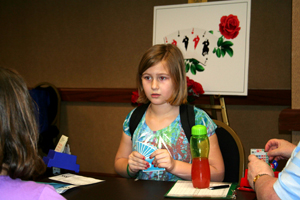Versailles 9-Year-Old Improves Grades By Playing Bridge
When 9-year-old Konner Spalding of Versailles began playing bridge with her grandparents four years ago, her family didn’t anticipate the impact the game would have on her education.
“Konner wanted to spend more time with her grandparents and go on ‘vacations’ [to tournaments],” said Konner’s mother, Ashley Spalding. “But I’ve seen an improvement in math skills as well as critical thinking. Obviously there’s a lot of strategy in bridge.”
According to Christopher Shaw, a researcher from Carlinville Ill., Konner’s educational advances have everything to do with the game she enjoys playing. Shaw performed a five-year study to determine the impact playing bridge may have on the standardized testing scores of its younger players.
Shaw examined six groups of fifth-graders from the Carlinville public schools who were similar in academic ability. One group learned to play bridge as part of its math instruction, but the other five groups did not.
All of the students took the Iowa Test of Basic Skills (ITSB) before bridge instruction began and then again in sixth grade and seventh grade. The results were overwhelming.
Shaw found that students who learned to play bridge showed greater improvements during their junior high years than their non-bridge playing classmates in the subject areas of reading, language, math, science and social science.
Most notably, the young bridge players out-scored their counterparts by 39.31% in science, 24.22% in math, and 22.74% in social science.
“Konner has always been a good student, but bridge has taken her to another level for a fourth-grader,” said her mother, Ashley. “She thinks before she plays. Using her critical thinking skills, she makes a plan to try and determine what cards her opponents are holding.”
The improvement that learning bridge provides to students’ test scores is believed to be imbedded in the cognitive skill of reasoning, a critical skill involved in bridge.
“Bridge is a game that develops inferential reasoning skills, which are very difficult to teach elementary students,” Shaw said. “These skills appear to be used in all five subject areas in middle school.”
School systems are beginning to take advantage of the education programs made available to them through the American Contract Bridge League.
In its second year, Konner’s grandparents, Sandra and Michael Marlin, teach an after-school bridge class at Huntertown elementary in Versailles where Konner attends. Not only have nine students returned from last year, but another eight have joined, giving Konner plenty of friends to play with.
One of the newer members is her 5-year-old sibling, Kendall, who according to her mother, Ashley, says can already count her points and place her cards in suits and numerical order.
Said Konner: “I like playing bridge, meeting people and traveling. It would be great for lots of kids to learn to play Bridge because it helps with math and gets your mind working. You can also meet other kids, too.”
Darbi Southers is an educator, writer and publicist living in Memphis. To find your child a Bridge teacher, or to learn more information about bringing the game of bridge into their classroom, visit www.acbl.org/teachers/index.html.


